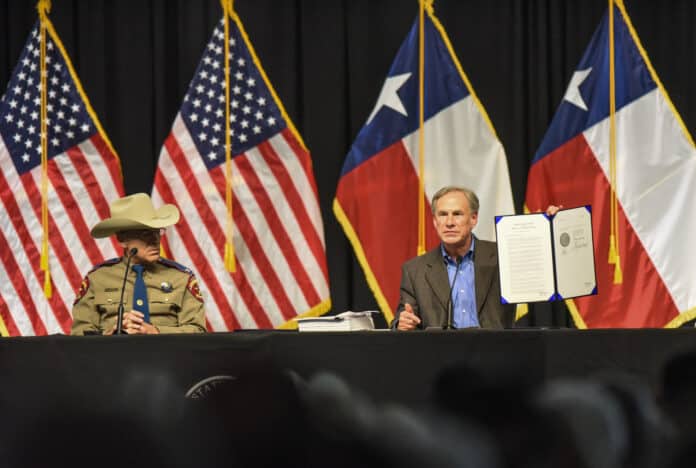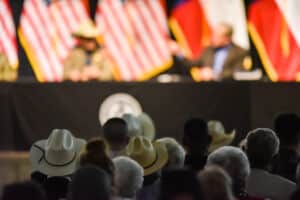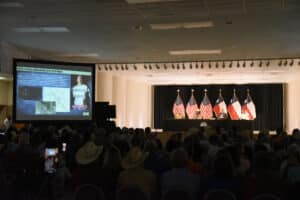
DEL RIO — A multi-faceted, Trumpian border security plan that’s defiant of President Joe Biden’s immigration policy was signed and announced here by Gov. Greg Abbott on Thursday.

(Valerie Gonzalez | [email protected])
The plan primarily focuses on law enforcement strategies to deter immigration. Some Rio Grande Valley leaders, however, received the news with skepticism.
Hundreds of law enforcement leaders, elected officials and stakeholders along the border packed into Del Rio’s Civic Center to attend the Border Security Summit called by the governor’s office last week.
(Read: Abbott: Texas will build a border wall; State will allocate $1 billion for security)
Gov. Abbott held private meetings with local officials before the public meeting where he was joined onstage with Texas Division of Emergency Management Chief Nim Kidd, Major General Tracy Norris of the Texas Military Department, and Texas Department of Public Safety Director Steve McCraw.
Abbott said the summit’s location was carefully considered.
“They used to be highly focused in the Rio Grande Valley region,” Abbott said, referring to migrants crossing the border. “Now we see a massive increase in the number of people coming across the border where we are right now, which is Val Verde County.”
(Read: Hidalgo County judge meets with stakeholders ahead of Abbott’s border summit)
The summit served as a platform to announce several major changes including a new disaster declaration that will be made public next week.
It will consist of an “intensified focus to make sure that we make it even more difficult for people to come into the state illegally,” Abbott said. “It will focus on making arrests, the Department of Public Safety will work with local officials to arrest anyone who enters our state illegally and is found as trespassing, engaged in vandalism, criminal mischief or smuggling.”

(Valerie Gonazalez | [email protected])
More jail space will be created, if a county needs it, to house those prosecuted for the trespassing. Abbott said the confinement should serve as a deterrent.
“We want to arrest somebody to have them prosecuted, to be put in jail, to stay in jail, to create an environment where people will choose they don’t want to come across the border in the State of Texas anymore because it’s not what they were expecting,” Abbott said. “It’s not the red carpet that the federal administration rolled out to them.”
The increase in resources needed for the governor’s plan will be drawn from the newly approved Texas legislature’s budget that allocates over a billion dollars for border security, Abbot said. It will also increase the presence of the Texas Military Department and allow for the use of more boats and aircraft along the river.
(Read: Abbott’s migrant disaster declaration met with criticism in RGV)
Like former President Donald Trump’s border strategies, Abbott included the addition of barriers along the border. He said a plan to build the border wall will be announced the following week. The news was received with enthusiasm from those in attendance who applauded loudly as they stood in ovation.
Hidalgo County Judge Richard F. Cortez, who was among the local stakeholders in attendance for Thursday’s summit, wasn’t as convinced.
“I know that we have a failed system. The system that we have isn’t working,” he said, but added, “putting more money and more resources to address the causes of a failed policy isn’t the answer because it doesn’t fix the problem.”
Cortez considered the logistics of jailing migrants arrested for criminal trespass.
“If we’re talking about thousands of people being charged with this class B misdemeanor, it all requires incarceration,” Cortez said. “It requires an arrest. Who’s going to test them for COVID when we put them in jail? Are we going to have a bed for them in jail? Where are we going to put them? How long are we going to keep them? How long is it going to take for them to go to a judge? Is a judge going to be available? It gives me just a headache to think about it.”
Before the governor issued a disaster declaration June 1, he asked counties to send his office an estimate of the approximate costs of the sudden spike in migrants arriving in their communities.
Cortez said he asked for assessments but to no avail.
“This is a major undertaking,” Cortez said of the governor’s plans for the border.
“I think he should be advocating for the state of Texas and the border region to the federal government to fix the problem, to address the problem before taking action such as this,” he added.
“When I see people that are hungry, I see people that don’t have money for health care — 37% of our children are food insecure in Hidalgo County, and 15% of our senior citizens are food insecure in our county — we don’t seem to have money to help them, but we seem to have money to do this. I worry about what is important.”
Hidalgo County District Attorney Ricardo Rodriguez, who was on-hand in Del Rio, didn’t exactly share Cortez’s sentiments.
“Nobody’s called us, and we’re at the forefront of the border,” Rodriguez said, referring to the federal government. “Now, how many times have I met with Abbott; how many times has he reached out? Many times. Many times.”
Rodriguez said he believes the governor’s intention is to safeguard Texas communities and send a strong message across the border: “If you commit a crime over here, you’re going to be prosecuted.”



